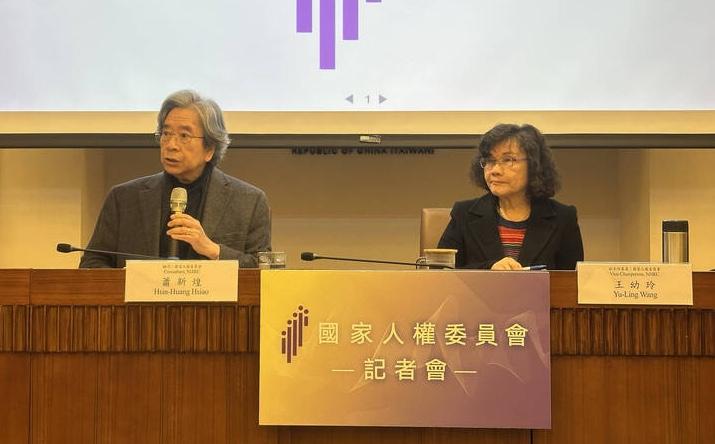There should be clear legal norms defining what constitutes “propaganda for war,” the National Human Rights Commission said today, after three Chinese-born social media influencers had their residence permits revoked for advocating military “unification.”
Article 20 of the International Covenant on Civil and Political Rights stipulates that “any propaganda for war shall be prohibited by law,” commission Vice Chairwoman Wang Yu-ling (王幼玲) told reporters at a news conference in Taipei when asked about the deportations.
International reviews have suggested that such speech be legally defined, but Taiwan has yet to pass any legislation on the matter, she said.

Photo: Lin Che-yuan, Taipei Times
The commission supports creating clear legal definitions, including that of “advocating,” “war” and “propaganda,” she said.
The law should also stipulate whether such contraventions should be prosecuted under the Civil Code or Criminal Code, she added.
When revoking the influencers’ permits, the Ministry of the Interior cited the “risk to national security or social stability” in the Measures for the Permission of Family-based Residence, Long-term Residence and Settlement of People from the Mainland Area in the Taiwan Area (大陸地區人民在台灣地區依親居留長期居留或定居許可辦法), Wang said.
As Taiwan is governed by the rule of law, the commission is to investigate whether these administrative measures took into account the principles of legal certainty, proper procedural and proportionality, she said.
The ministry should also have a mechanism for scrutinizing such questions, she said, adding that the Chinese side is also pursuing administrative remedies.
After discussion, the commission has decided to collect independent assessments of the case informed by international covenants, as it involves questions of national security, freedom of speech, the right for families to stay together and other important issues, Wang said.
Additional reporting by CNA

Taiwanese were praised for their composure after a video filmed by Taiwanese tourists capturing the moment a magnitude 7.5 earthquake struck Japan’s Aomori Prefecture went viral on social media. The video shows a hotel room shaking violently amid Monday’s quake, with objects falling to the ground. Two Taiwanese began filming with their mobile phones, while two others held the sides of a TV to prevent it from falling. When the shaking stopped, the pair calmly took down the TV and laid it flat on a tatami mat, the video shows. The video also captured the group talking about the safety of their companions bathing

US climber Alex Honnold is to attempt to scale Taipei 101 without a rope and harness in a live Netflix special on Jan. 24, the streaming platform announced on Wednesday. Accounting for the time difference, the two-hour broadcast of Honnold’s climb, called Skyscraper Live, is to air on Jan. 23 in the US, Netflix said in a statement. Honnold, 40, was the first person ever to free solo climb the 900m El Capitan rock formation in Yosemite National Park — a feat that was recorded and later made into the 2018 documentary film Free Solo. Netflix previewed Skyscraper Live in October, after videos

Starting on Jan. 1, YouBike riders must have insurance to use the service, and a six-month trial of NT$5 coupons under certain conditions would be implemented to balance bike shortages, a joint statement from transportation departments across Taipei, New Taipei City and Taoyuan announced yesterday. The rental bike system operator said that coupons would be offered to riders to rent bikes from full stations, for riders who take out an electric-assisted bike from a full station, and for riders who return a bike to an empty station. All riders with YouBike accounts are automatically eligible for the program, and each membership account

A classified Pentagon-produced, multiyear assessment — the Overmatch brief — highlighted unreported Chinese capabilities to destroy US military assets and identified US supply chain choke points, painting a disturbing picture of waning US military might, a New York Times editorial published on Monday said. US Secretary of Defense Pete Hegseth’s comments in November last year that “we lose every time” in Pentagon-conducted war games pitting the US against China further highlighted the uncertainty about the US’ capability to intervene in the event of a Chinese invasion of Taiwan. “It shows the Pentagon’s overreliance on expensive, vulnerable weapons as adversaries field cheap, technologically